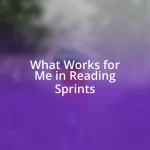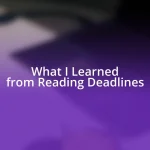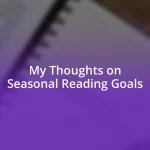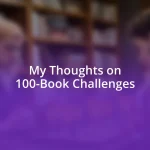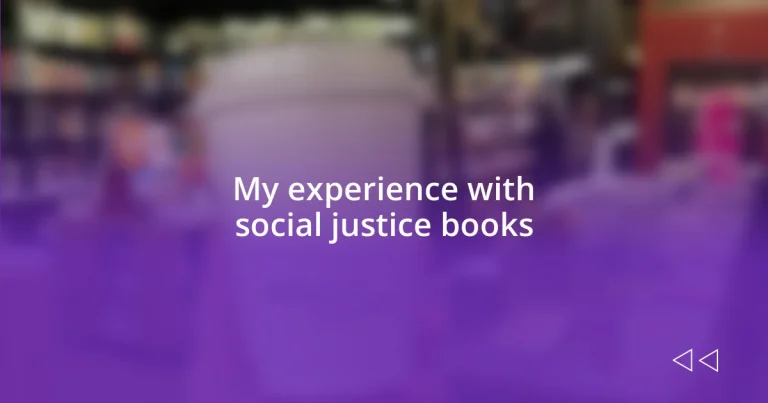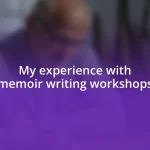Key takeaways:
- Social justice literature fosters critical awareness and empathy, challenging readers to confront their biases and engage in meaningful discussions about systemic issues.
- Diverse genres, including memoirs and critical theory, contribute to a richer understanding of social justice, encouraging vulnerability and personal growth.
- Key authors like Ijeoma Oluo, bell hooks, and Audre Lorde inspire readers to take action, reflect on their experiences, and advocate for change in their communities.
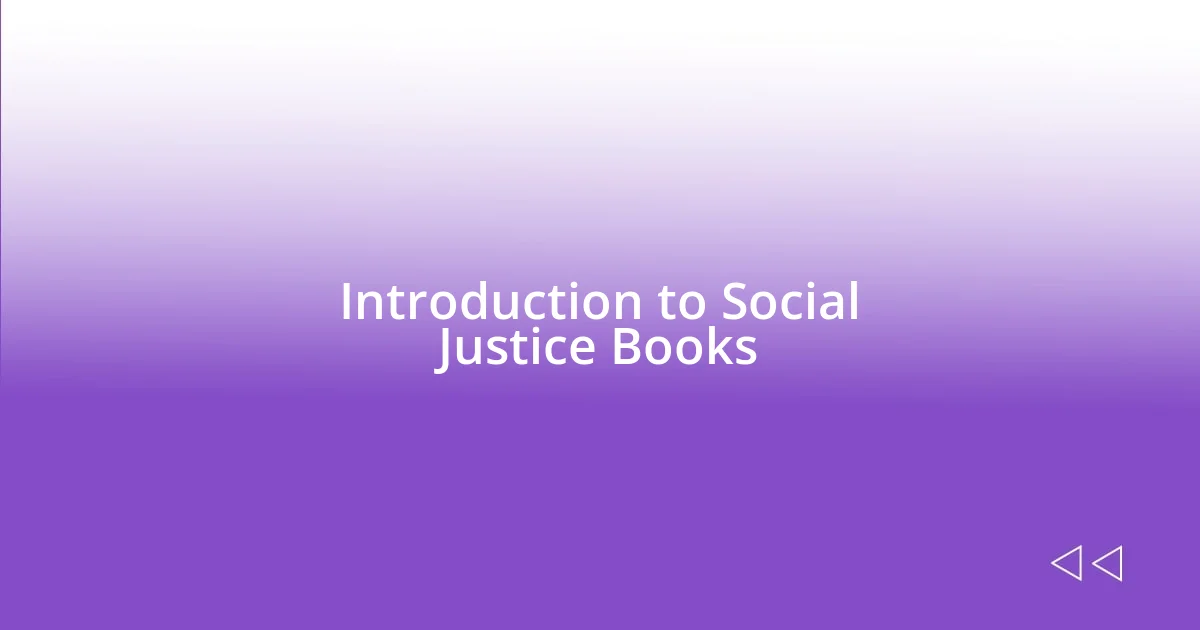
Introduction to Social Justice Books
Social justice books have become a vital tool for understanding the complexities of equality, identity, and systemic issues in our society. I remember when I first picked up a social justice book; it was like a light bulb went off in my mind. The narratives and statistics opened my eyes to realities I had never contemplated before, making me challenge my own biases and perceptions.
From memoirs to critical analyses, these books can profoundly impact how we see ourselves and others. It’s intriguing how one author’s perspective can change your understanding of a social issue. Have you ever read a book that made you question your beliefs or assumptions? For me, that moment came when I read a powerful narrative about growing up in a marginalized community; it was an emotional experience that prompted deep reflection on privilege and injustice.
As I delved further into this genre, I discovered that social justice literature is not just a call to action; it’s also an invitation to empathy. Each story carries the weight of human experience, inviting readers to step into someone else’s shoes. Isn’t it fascinating how these narratives can spark conversations that lead to real change? Engaging with these books encouraged me to take a more active role in my community, spurring a desire to advocate for those whose voices have been historically silenced.
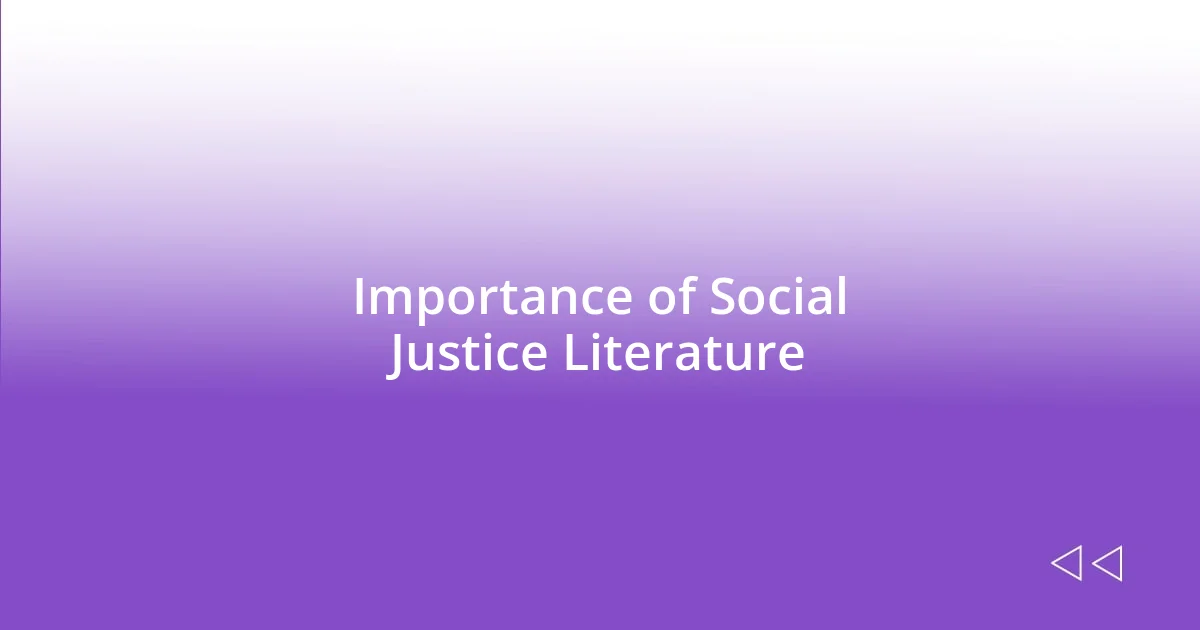
Importance of Social Justice Literature
The importance of social justice literature lies in its ability to foster critical awareness. When I read books like “White Fragility” by Robin DiAngelo, I was confronted with uncomfortable truths about my own racial biases. It’s not always easy to confront these aspects of ourselves, but the insights gained can lead to significant personal growth and a deeper understanding of societal structures.
These books also serve as a bridge between diverse experiences and perspectives. I recall a moment in a book club discussion where we explored “The Hate U Give” by Angie Thomas. The emotional connections and heated debates that emerged highlighted how literature can spark vital discussions around race, privilege, and justice. It was refreshing to see how different backgrounds enriched the conversation, making me appreciate the power of storytelling.
Moreover, social justice literature can be a catalyst for change. After diving into various narratives, I felt compelled to participate in advocacy efforts, such as community organizing and educational outreach. Books have a unique ability to transform knowledge into action, propelling individuals toward making a positive difference in society. Isn’t it inspiring how words can motivate people to take concrete steps toward justice?
| Aspect | Importance |
|---|---|
| Critical Awareness | Encourages self-reflection on biases and societal issues. |
| Diverse Perspectives | Enhances empathy through exposure to different life experiences. |
| Catalyst for Change | Inspires readers to take action and advocate for justice. |
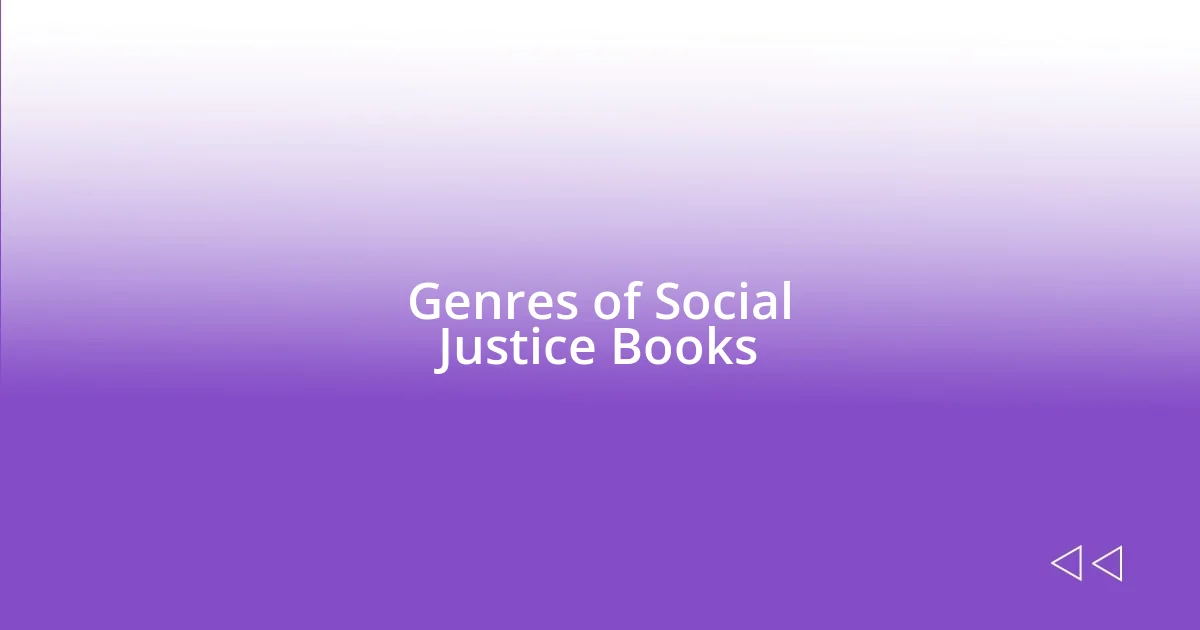
Genres of Social Justice Books
There are various genres of social justice books, each offering its unique approach to difficult topics. I’ve found that reading across these genres deepens my understanding and often challenges my preconceived notions. From gripping autobiographies to scholarly critiques, each genre brings its own flavor, making the conversation surrounding social justice richer and more nuanced.
Here’s a quick overview of some key genres I’ve explored:
-
Memoirs/Biographies: Personal narratives that share individual experiences with oppression and resilience. When I read “Just Mercy” by Bryan Stevenson, I felt a strong emotional connection to his fight for justice, which inspired me to learn more about the criminal justice system.
-
Historical Accounts: Books that provide context and detail about social justice movements, like “The Best We Could Do” by Thi Bui, remind us of the struggles faced by previous generations and the ongoing fight for equality.
-
Critical Theory: These texts examine societal structures and their impact on marginalized communities. I remember getting lost in “Pedagogy of the Oppressed” by Paulo Freire, which shifted my perspective on education as a tool for liberation.
-
Fiction: Novels that tackle social issues through compelling storytelling can be incredibly moving. “Between the World and Me” by Ta-Nehisi Coates, written in the form of a letter, had a profound emotional impact on me, forcing me to confront my own privilege through the lens of another’s lived experience.
Exploring these genres made me realize that social justice literature isn’t just about imparting knowledge—it’s about creating a shared space for vulnerability and growth. Each book invites readers to reflect, connect emotionally, and, at times, take action, which brings a powerful sense of purpose to my reading journey.
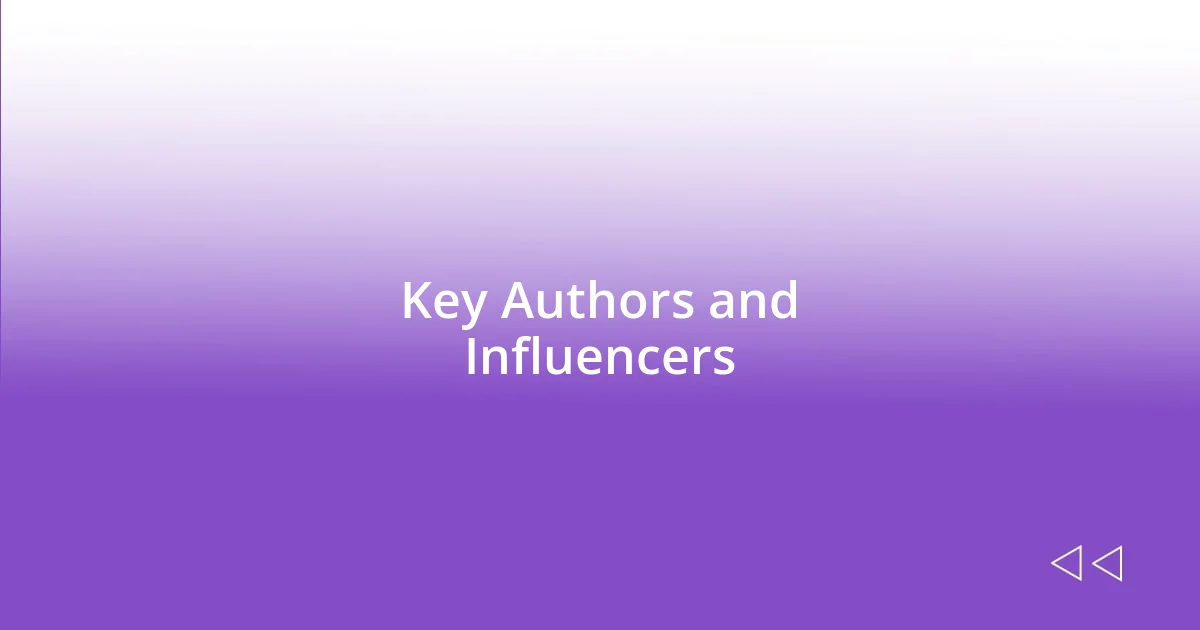
Key Authors and Influencers
When it comes to key authors and influencers in social justice literature, a few names stand out strongly in my mind. I remember picking up “So You Want to Talk About Race” by Ijeoma Oluo and feeling a wave of relief wash over me—it was a guide I didn’t know I needed. Oluo’s straightforward approach not only tackled systemic racism but also made the conversation accessible for those of us who were just starting to engage with these issues. Have you ever found an author who feels like a friend guiding you through tough conversations? That was Oluo for me.
Another transformative figure has been bell hooks, whose work profoundly shaped my understanding of intersectionality and feminism. When I read “Ain’t I a Woman?” I felt as though she was challenging me directly to rethink how I perceived both race and gender. Hooks’ ability to weave personal narratives with broader social theories made me reflect on my own experiences through a deeper lens. It’s fascinating how language can both challenge and uplift—isn’t it?
Lastly, I can’t overlook the impact of writers like Audre Lorde. Her poetry resonates with passion and urgency that ignites a fire within me, pushing me to confront my own complacency. “Sister Outsider” was a real eye-opener; each essay felt like a call to arms. It’s interesting how one author’s words can inspire so much action and reflection in someone else, don’t you think? For me, Lorde’s influence reminds me that our voices need to be heard, and there’s power in standing up for what’s right.
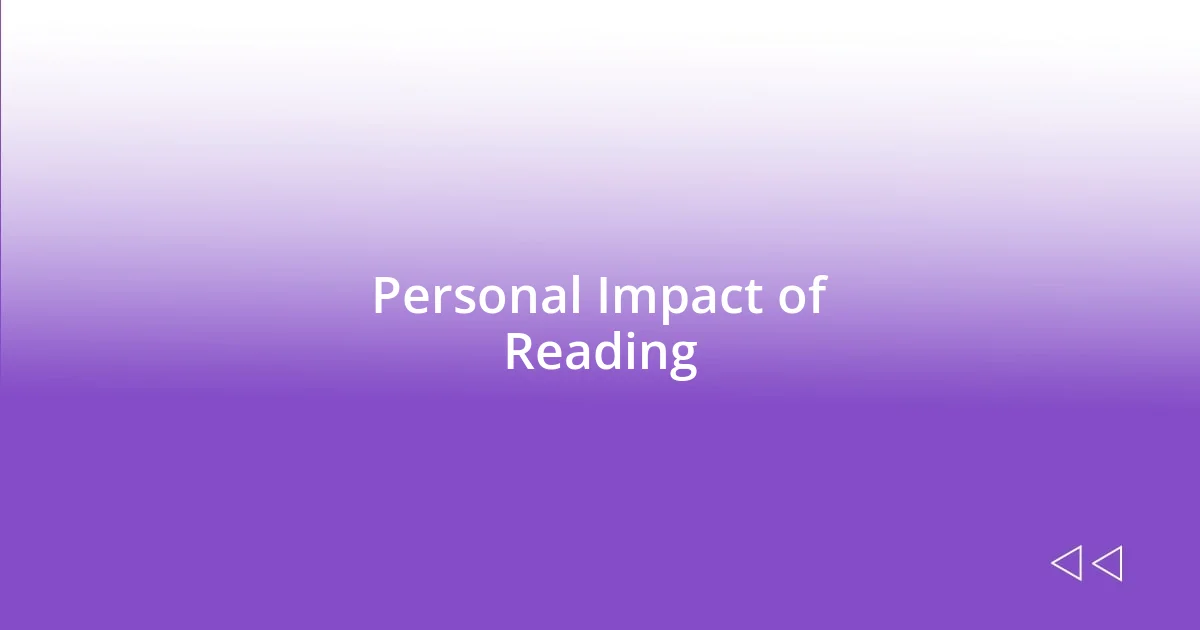
Personal Impact of Reading
Reading social justice books has profoundly impacted my worldview, often shifting my outlook in unexpected ways. I recall finishing “The Hate U Give” by Angie Thomas and feeling an overwhelming mix of anger and empathy. The characters’ struggles pushed me to reflect on my own privilege and responsibilities, prompting me to engage more actively in discussions about race and police brutality. Have you ever finished a book and felt like it changed your worldview overnight? For me, that moment came not just from the story, but from realizing my role in the ongoing fight for justice.
I’ve also found that social justice literature has served as a catalyst for my personal growth. When I dove into “Me and White Supremacy” by Layla Saad, I was struck by how much I hadn’t considered about my own biases and assumptions. That book felt like a mirror held up to my face, revealing my complicity in systems of oppression. It was uncomfortable, yet necessary, leading me to have intense conversations with friends that I might have shied away from before. Isn’t it fascinating how discomfort can lead to growth?
Moreover, the emotional weight of these books often lingers long after I’ve turned the last page. I can still recall moments from “How to Be an Antiracist” by Ibram X. Kendi, where his words struck deep chord within me, challenging my preconceptions and inspiring me to act. This reading experience deepened my commitment to self-education and allyship in ways I hadn’t anticipated. It makes me wonder—how often do we allow literature to spark personal change, and are we ready to embrace the journey that follows?
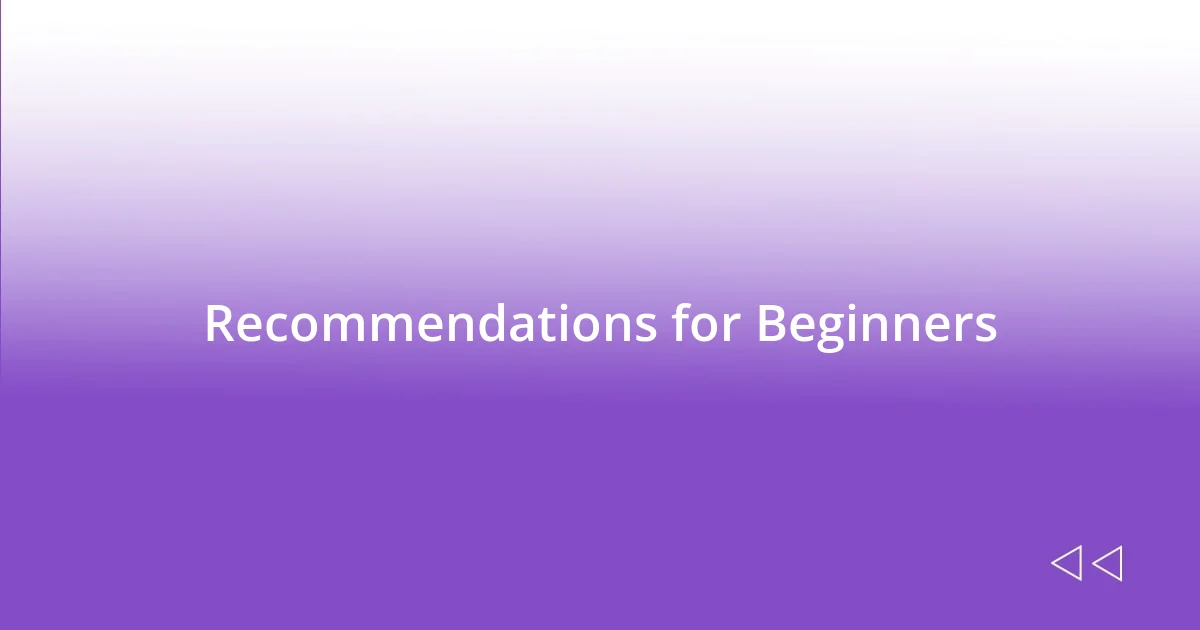
Recommendations for Beginners
When starting your journey into social justice literature, I wholeheartedly recommend “Just Mercy” by Bryan Stevenson. The way Stevenson narrates his personal experiences with the injustices of the American legal system grabbed my attention entirely. The blend of storytelling and critical analysis made me realize how deeply systemic issues affect real lives. Have you ever finished a book and found yourself wanting to do something about what you learned? “Just Mercy” compels you to advocate for change, and that sense of urgency really struck a chord with me.
Another fantastic starting point is “The New Jim Crow” by Michelle Alexander. When I first delved into her exploration of mass incarceration and its ties to racial discrimination, it felt as though a veil had been lifted from my eyes. Her compelling arguments prompted me to reassess what I thought I knew about criminal justice. I found myself engrossed in discussions with friends, as her insights made it impossible to remain indifferent. Have you experienced that moment when a book transforms your everyday conversations? For me, that realization was powerful—living in awareness is a vital first step toward advocating for justice.
For a more personal and relatable perspective, “The Fire Next Time” by James Baldwin is an essential read. Baldwin’s courageous reflections on race and identity profoundly resonated with me, especially during our current social climate. His passionate arguments about love and understanding amid division made me reconsider how I engage with others who hold different perspectives. It’s astonishing how Baldwin’s words can stir deep emotions and inspire dialogue—have you ever felt so moved by an author that you could hear their voice long after putting the book down? Connecting with Baldwin’s work truly reinforced the importance of empathy and active listening in our fight for justice.
